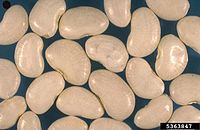
Photo from wikipedia
Most plant species naturally associate with arbuscular mycorrhizal fungi (AMF), which are known to promote crop nutrition and health in agroecosystems. However, information on how mycorrhizal associations affect plant biotic… Click to show full abstract
Most plant species naturally associate with arbuscular mycorrhizal fungi (AMF), which are known to promote crop nutrition and health in agroecosystems. However, information on how mycorrhizal associations affect plant biotic interactions that occur aboveground with foliar herbivores is limited and needs to be further addressed for the development of pest management strategies. With the objective to examine the influence of maize mycorrhizas on foliar herbivory caused by larvae of Spodoptera frugiperda, a serious pest in maize agroecosystems, we performed a fully factorial greenhouse pot experiment with three factors: Maize genotype (Puma and Milpal H318), AMF (with and without AMF, and without AMF with mineral P) and Insect herbivory (with and without S. frugiperda). Main results showed that inoculation with AMF improved plant growth and foliar P concentration, which coincided with increased foliar damage from herbivory and higher biomass of S. frugiperda larvae. A significant positive correlation between shoot P concentration and larval biomass was also observed. Finally, foliar herbivory by S. frugiperda slightly increased and decreased AMF root colonization in Puma and H318, respectively. In conclusion, our results show that maize plant benefits from AMF in terms of promotion of growth and nutrition, and may also increase the damage caused from insects by improving the food quality of maize leaves for larval growth, which seems to be linked to increased P uptake by the maize mycorrhizal association.
Journal Title: Mycorrhiza
Year Published: 2019
Link to full text (if available)
Share on Social Media: Sign Up to like & get
recommendations!